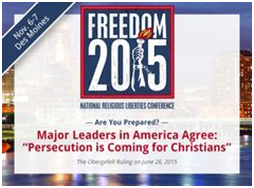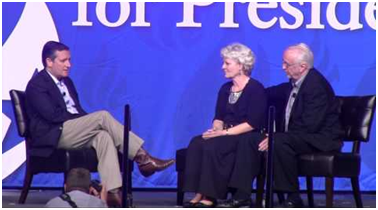Twisting Liberty Inside Out
Whenever I hear some of my fellow Christians talk about “religious freedom,” I think of that line from “The Princess Bride”: “You keep using that word. I don’t think it means what you think it means.”
 An ad promoting last November’s National Religious Liberties Conference in Des Moines – Photo: Pinterest
An ad promoting last November’s National Religious Liberties Conference in Des Moines – Photo: Pinterest
This week Des Moines is hosting the National Religious Liberties Conference. Attendees have come to rally under the banner of “religious freedom.” Throughout the event, they will no doubt be told that persecution against Christians is a great and growing problem, not only around the world but right here in the United States.
On this, at least, we agree: Religious persecution is a terrible thing. I know because I’ve seen it up close. Before the Varnum decision made marriage equality the law of the land here in Iowa, I saw my friends, my neighbors and my parishioners routinely denied equal protection under the law. I am grateful that those days are behind us now.
But some of my fellow Christians keep crying “persecution.” They are demanding respect for their “religious freedom.” And I don’t think that concept means what they think it means.
Here is what I think it means: In our nation, each individual enjoys the right to worship (or not!) according to his or her own conscience, and that right shall not be infringed. This matters so much that our founders enshrined it in the very first amendment to our Constitution. They wanted to guarantee that Americans would always be free from religious compulsion in every form.
But some of my fellow Christians see it a little differently. They seem to think that “religious freedom” means the freedom to impose their beliefs on people who do not share them. And if they cannot compel you to live according to their peculiar notions about the nature of marriage or the rights of women, they will claim that their “religious freedom” is under assault.
This is actually the opposite of religious freedom. It is deeply un-American. And the preacher in me cannot resist pointing out that it would also seem to run contrary to Jesus’ suggestion that we do unto others as we would have them to do unto us.
As a Christian minister, I am saddened to see my faith turned into a tool to push for the unequal treatment of single parents and same-sex couples. And I am leery of the candidates who will come pandering to the NRLC meeting, promoting fear for political gain.
 Betty and Richard Odgaard in dialogue with Senator Ted Cruz, Republican candidate for president, at a Religious Liberty Rally in Des Moines last summer in preparation for the November gathering, where he said that atheists were unfit to be president. – Photo: Vimeo
Betty and Richard Odgaard in dialogue with Senator Ted Cruz, Republican candidate for president, at a Religious Liberty Rally in Des Moines last summer in preparation for the November gathering, where he said that atheists were unfit to be president. – Photo: Vimeo
Because, for all of the NRLC’s sound and fury, American religious liberty looks alive and well to me. A recent high-profile case, here in Iowa, can serve to illustrate the emptiness of these claims to religious persecution.
Betty and Richard Odgaard, former owners of a wedding venue in Grimes, are scheduled to appear at today’s conference. The Odgaards, who operated a commercial, for-profit art gallery — not a religious institution or church — refused to host a wedding for a same-sex couple, in direct violation of Iowa law. No one is arguing that the Odgaards should have to abandon their religious beliefs and convictions. Their right to hold those beliefs is protected under the First Amendment.
What the law does not allow them to do, however, is use those religious beliefs to discriminate against customers of their business. The Odgaards have since sold their gallery to a church, which has the religious freedom to marry whomever they choose. But every business should be open to any member of the public.
Most Americans agree. Poll after poll shows the American people believe in equality by wide margins and don’t want to live in a country where discrimination is permitted by law.
Religious liberty has never meant the liberty to discriminate. As Americans, we know better than that. As a Christian, I believe that I am called to work for a world marked by equality, fairness, and justice. The NRLC is, of course, perfectly free to argue for their right to discriminate against others. I just wish they wouldn’t hijack my faith in order to make their case.
Here are the facts: We are not living in a country where people are blocked from attending church services, from praying to their God, or sharing the message of the gospel. The First Amendment has always protected the rights of churches and clergy to express and to act on their faith, and nothing about that has changed. We are, however, living in a country where people are turned away from wedding venues and other establishments because of who they are or whom they happen to love. If any one’s liberty is threatened, it is theirs. To claim otherwise is deeply irresponsible.
Freedom of religion will always be among the most vital of American values. It deserves protection. But we cannot protect what we do not understand. And for all of the lip service paid to “religious liberty” by the NRLC, I believe they have missed the meaning of this critical value.
So as my friends descend on Des Moines for the NRLC — as they gather in the name of religious liberty — I hope they will pause to ponder the true meaning of this most American value. We owe it to one another to resist discrimination, to guard the dignity of all people, and to advocate for authentic religious freedom in the face of every counterfeit claim.
I think that would be the Christian thing to do.
This essay was first published by the Des Moines Register on November 5, 2015 and is reposted with its permission.
